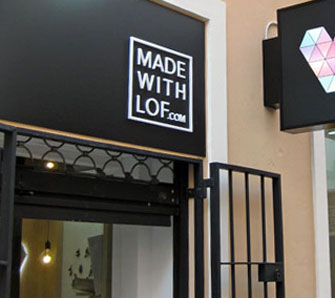
The first time I went to Seville, I missed out entirely on one of the most important aspects of the local culture. In my report from two years ago, I discussed the city’s lovely and ubiquitous orange trees, its beautiful and omnipresent ceramic tilework and its comely and inescapable vestiges of ancient buildings. But somehow I failed to notice one other fundamentally important attraction: its baffling and pandemic pseudo-English shop signs.
Actually, there’s another aspect of the local culture that I missed out on then and also on my most recent trip this Christmas: flamenco. One of the many great things about Seville is that you can hear flamenco music virtually anywhere. I’ve seen it happen: in a café in the evening, someone takes out a guitar and starts strumming, someone else starts humming and soon everyone is clapping out the rhythm…
On this last trip, I went out for a walk one night, overheard a guitarist holding forth in a bar and paused out on the sidewalk to listen. The style was pure flamenco, but somehow the song seemed familiar. Then it dawned on me: he was playing “My Way.”
Fearing for the sanctity of Andalusia’s heritage, as well as my ability to stifle the gag reflex, I hurried down the street, where (this is all true) two blocks farther on another guitarist was plucking his heart out, so to speak, in another bar. I stopped to listen, hoping for a bit more authenticity, and went through the same phases: intrigued appreciation, followed by an inkling that I’d heard the tune before, followed by the deflating realization that it was yet another emetic American pop ditty from the 1970s — in this case, Barry Manilow’s “Could It Be Magic?”
I had to wonder: with such a rich and wonderful traditional repertoire, why would any flamenco guitarist want to play such purgative schlock? My guess: it makes the dancers stomp even more loudly on the floor.
Now that I’ve given everyone two earworms, I promise to devote the rest of this report to the baffling pseudo-English shop signs. Like this one on Plaza Alfalfa:
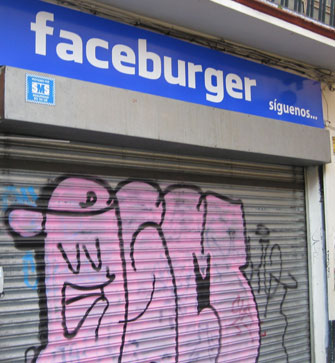
At last, a place where you can literally get lip service! And speaking of contrived portmanteau words to sell cheap food, on Plaza de la Encarnación they also have:
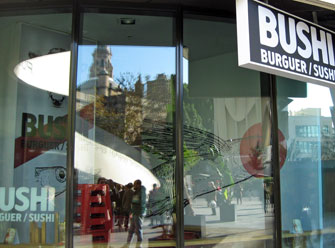
Perfectly logical! You see, they make sushi and they also make “burguers,” so…
So we’d probably be better off sticking to poultry. For example, here:
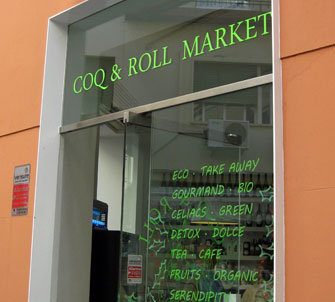
The mixture of languages in that list on the door is quite impressive. Not quite comprehensible (“A double portion of serendipity, please, with extra cheese”) but quite impressive.
And while I’m on a roll:
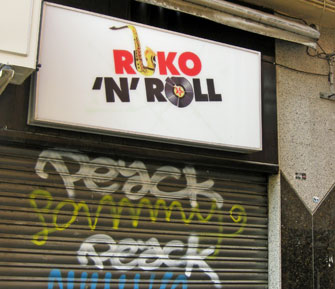
Would you like some six and drogs with that? For the latter, you might try this place:
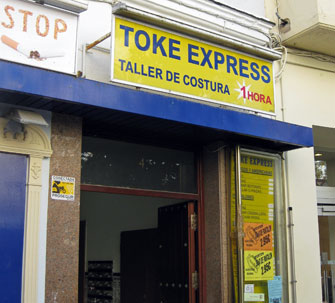
Given Spain’s liberal marijuana laws, I’d be willing to bet that this dry-cleaning place gets at least a dozen American backpackers every summer who come in expecting to find an Amsterdam-style coffee shop.
Full disclosure: Toke Express is actually not in Seville but in the nearby (and stunning) town of Cadiz, where I also found:
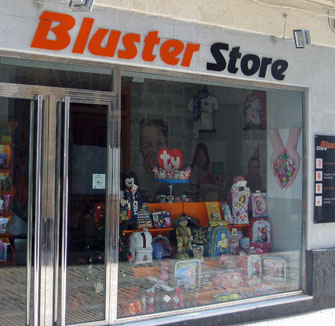
So that’s where it all comes from! I didn’t know that you could just go buy the stuff! Too bad it was closed! I hope I can order online. With extra cheese.
Now then, back in Seville, from bluster to butter:
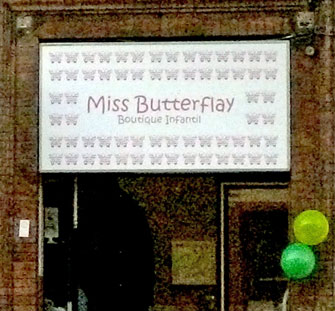
Oh what a difference a letter makes. In particular since it’s a children’s store, I have to hope that this Miss B. doesn’t slice herself up the way Madame did. Or maybe I’m just making a hasty and ill-conceived association.
Like this one:
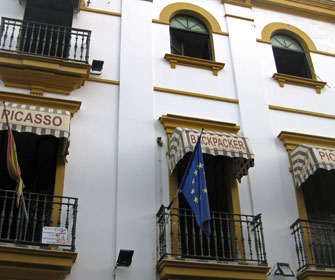
This is a hotel in the center of town that apparently caters to nano-budget Eurail trash who also happen to be art collectors. A niche no one ever thought to address!
But when Faceburger is closed, where are those Europe-on-a-bootstring urban hikers going to find a centavo-saving meal? They can always trek on over to:
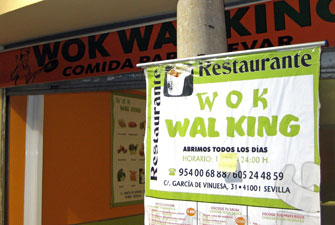
Now here’s a good example of the kind of thinking that sets the true marketing visionary apart from the rest of mankind. The other 6,999,999,999 of us look at the words “wok” and “walk” and say, “Yeah, they sound the same. So what?”
But the marketing wizard goes further, adding, “So, for the love of god, do not use those words together in the name of a restaurant!”
But, of course, not everyone listens to advice. Although I suspect that the owners of this next place did:
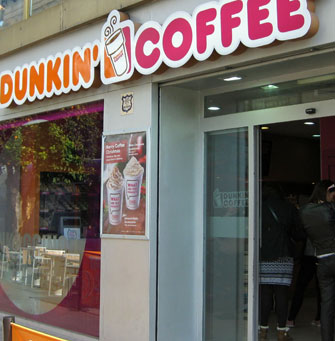
Judging from the logo and the prominent location (next to a Burger King on a main thoroughfare), my guess is that this is the actual Spanish subsidiary of Dunkin’ Donuts, and that the branding experts decided that Spaniards wouldn’t understand “donuts,” so they replaced it with a better-known English word.
But I love the implication: what exactly do you “dunk” coffee in? And how? And can I watch?
And most importantly, is it humanly possible to come up with an even more dumbfoundingly ludicrous business name based on that same brand?
The answer, I am very pleased to report, is yes:
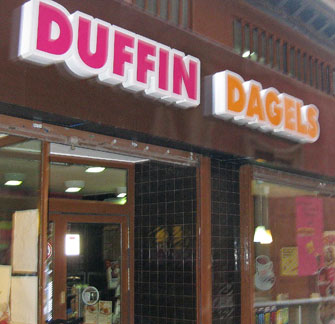
My poorly focused photo is as pathetic as the line of reasoning here, which I imagine was:
1) We want to sell muffins and bagels.
2) Dunkin’ Donuts is a success.
3) “Muffin” ends with the same two letters as “dunkin’.”
4) So…
So the choice is clear: we should name the place “Facewok.”
Have you seen a ridiculous sign in Paris? Or anywhere in France? Or anywhere kind of vaguely near France? Please send me a photo in care of contact@paris-update.com.
© 2014 Paris Update
FavoriteAn album of David Jaggard’s comic compositions is now available for streaming on Spotify and Apple Music, for purchase (whole or track by track) on iTunes and Amazon, and on every other music downloading service in the known universe, under the title “Totally Unrelated.”
Note to readers: David Jaggard’s e-book Quorum of One: Satire 1998-2011 is available from Amazon as well as iTunes, iBookstore, Nook, Reader Store, Kobo, Copia and many other distributors.
